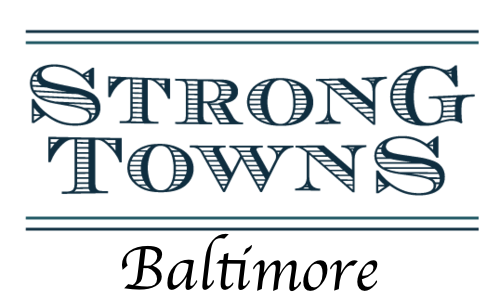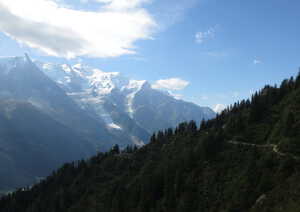Over the course of the past several years, I've become more and more involved in local advocacy efforts that touch on improving the bikeability and walkability of where I live. The COVID-related shutdowns helped with this, as it led to many/all meetings being held online, which made attending them much less onerous.
Fast forward to 6 months ago, when I was hit/clipped/grazed by a car while biking - running errands. That incident put some spring in my step to effect change. As it so happens, a few months later, I was tapped to become a member of my local bike-ped advisory committee. While the appointment was a big deal for me, I wanted more.
Tough Questions
In the weeks and months following my biking incident, I got to thinking more about my future. Given my sustainability principles, I couldn't see myself retreating away from my biking ways. But, with where I lived being as automobile-dominated as it is, I couldn't shake the worry that I was biking on borrowed time.
How long was I supposed to wait for the tide to turn - in a major way? When was I going to see significant bicycle infrastructure built where I live? When was I going to see biking supported as a first-class, safe mode of transportation? At what point did I have to call off the wait and move to someplace better-aligned with my lifestyle?
Those are tough questions. Given how attached I was to my home, my family, and my friends - and given the roots I had put down over the course of my lifetime, the answers were far from clear-cut. But, I was 47 years old. Before too long, I would be in my 50s. Finding myself in five years time, living in the same risky environment, seemed... unwise.
I was unable to reach any sort of immediate resolution. The best I could do was formulate an ill-defined 5-year plan, at the completion of which, I'd do... something. In the meantime, I resolved to make the most of my present and do more than just wait.
We The People
Right around that time, I found myself invited to attend an online meeting organized by a new advocacy organization local to where I live - We The People - Baltimore County. I found the meeting to be very illuminating, mostly because they were attempting to address issues which I was not aware were issues that needed addressing. Their plan included the following:
- Reform the zoning process to be controlled by the master plan (which is drafted based on extensive citizen input).
- Expand the use of "by-right" development.
- Encourage more mixed-use development.
- Undertake a wholesale and comprehensive review and simplification of local zoning laws, regulations and processes.
- Provide resources for communities to update their local development plans.
Given that I had just spent several of my evenings just a month earlier attending (online) meetings to provide citizen input into updates to my local master plan, the issues called-out by We The People - Baltimore County were eye-opening.
Not Just Bikes
Then I stumbled across Not Just Bikes. Not Just Bikes is (in its most visible form) a YouTube channel that presents "Stories of great urban planning and urban experiences from Amsterdam and the Netherlands." The channel has several dozen extremely informative, well-produced videos. I watched a number of them, finding myself becoming increasingly envious of the producer's automobile-independent lifestyle, a benefit of living in the Netherlands.
I started wondering if there was an advocacy organization I could support that was focused on the bikeability and walkability ills I wanted to see addressed. None came to mind.
However, I soon realized that a number of Not Just Bikes's videos present principles and ideas formulated by an organization called Strong Towns. These Strong Towns videos created by Not Just Bikes presented themselves before me at just the right time. That's it! Strong Towns!
Strong Towns
Strong Towns is a US-based advocacy organization that seeks to replace America’s post-war pattern of development, the Suburban Experiment, with a pattern of development that is financially strong and resilient. Strong Towns is engaged in five priority campaigns:
- Transparent accounting of local government finances
- Ending highway expansion
- Safe and productive streets via the deprioritization of automobile throughput
- Incremental housing development and evolution
- Ending parking mandates and subsidies
Eventually, through exposure to the points made by We The People - Baltimore County, then Not Just Bikes, then Strong Towns, I came to realize that my issue(s) wouldn't be addressed simply by the addition of some bike lanes to my local stroad. Instead, I came to realize that what was needed was a wholesale change in culture. And while that is a daunting prospect, that is exactly what Strong Towns is focused on achieving.
Very quickly, I dived in to everything that Strong Towns had to offer - articles, books, podcasts, videos, etc. There was no lack of content to explore.
Then I stumbled on their "local conversations" page. Intrigued, I looked to see what sort of presence existed in Baltimore. I found nothing. Without skipping a beat, I applied right away to get one going. After some conversations and other due diligence, myself and another local advocate obtained Strong Towns' blessing, got placed on their map of local groups, and have just this past week launched Strong Towns Baltimore!

Onward
I'm very impressed with the progress Strong Towns has made over the course of the past decade or so. In my mind, they have put together a very solid brand and have generated a lot of momentum. Their platform speaks to my concerns and priorities, and I am very happy to ride their coat tails.
At this point, I see Strong Towns Baltimore as both a culmination and a beginning. I'm excited to see where this effort leads.
Come along and join us!

Leave a comment
All comments are subject to review, so there will be a delay before they appear. You may include Markdown in your comment. I use the Akismet filtering service to reduce spam. Learn how Akismet processes comment data.